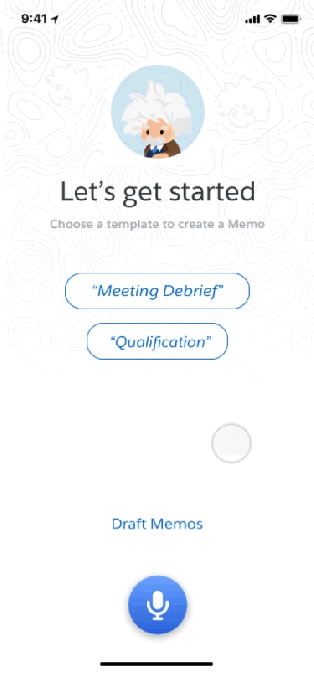Salespeople usually spend their days talking. They are on the phone and in meetings, but when it comes to updating Salesforce, they are back at the keyboard again typing notes and milestones, or searching for metrics about their performance. Today, Salesforce decided to change that by introducing Einstein Voice, a bit of AI magic that allows salespeople to talk to the program instead of typing.
In a world where Amazon Alexa and Siri make talking to our devices more commonplace in our non-work lives, it makes sense that companies are trying to bring that same kind of interaction to work.
In this case, you can conversationally enter information about a meeting, get daily briefings about key information on your day’s meetings (particularly nice for salespeople who spend their day in the car) and interact with Salesforce data dashboards by asking questions instead of typing queries.
All of these tools are designed to make life easier for busy salespeople. Most hate doing the administrative part of their jobs because if they are entering information, even if it will benefit them having a record in the long run, they are not doing their primary job, which is selling stuff.
For the meetings notes part, instead of typing on a smartphone, which can be a challenge anyway, you simply touch Meeting Debrief in the Einstein Voice mobile tool and start talking to enter your notes. The tool interprets what you’re saying. As with most transcription services, this is probably not perfect and will require some correcting, but should get you most of the way there.
It can also pick out key data like dates and deal amounts and let you set action items to follow up on.

Gif: Salesforce
Brent Leary, who is the founder and principal analyst at CRM Essentials says this is a natural progression for Salesforce as people get more comfortable using voice interfaces. “I think this will make voice-first devices and assistants as important pieces to the CRM puzzle from both a customer experience and an employee productivity perspective,” he told TechCrunch.
It’s worth pointing out that Tact.AI has been giving Salesforce users these kind of voice services for some time, and Tact CEO Chuck Ganapathi doesn’t seem too concerned about Salesforce jumping in.
“Conversational AI is the future of enterprise software and it’s not a question of if or when. It’s all about the how, and we strongly believe that a Switzerland strategy is the only way to deliver on its promise. It’s no wonder we are the only company to be backed by Microsoft, Amazon and Salesforce,” he said.
Leary things there’s plenty of room for everyone and Salesforce getting involved will accelerate adoption for all players. “The Salesforce tide will lift all boats, and companies like Tact will see their profile increased significantly because while Salesforce is the leader in the category, its share of the market is still less than 20% of the market.”
Einstein is Salesforce’s catch-all brand for its artificial intelligence layer. In this case it’s using natural language processing, voice recognition technology and other artificial intelligence pieces to interpret the person’s voice and transcribe what they are saying or understand their request better.
Typically, Salesforce starts with a small set of functionality and the builds on that over time. That’s very likely what they are doing here, coming out with a product announcement in time for Dreamforce, their massive customer conference next week,
